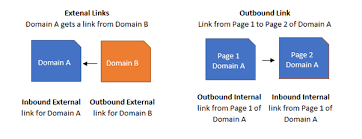The Power of Outbound Links in SEO
When it comes to Search Engine Optimization (SEO), outbound links play a crucial role in enhancing the credibility and authority of your website. While many focus on inbound links, outbound links are often underestimated in their impact on your site’s ranking and visibility.
Outbound links, also known as external links, are hyperlinks that point from your website to other websites. By including relevant and high-quality outbound links in your content, you signal to search engines that you are providing valuable information to your audience.
Key Benefits of Outbound Links for SEO:
- Enhanced Credibility: Outbound links to reputable sources demonstrate that you have done thorough research and are backing up your claims with reliable information.
- Improved User Experience: By linking to relevant external resources, you enrich the user experience by offering additional insights and supporting data.
- Increased Authority: Search engines view websites with outbound links as more authoritative and trustworthy, which can positively impact your own site’s ranking.
- Better Indexing: Outbound links help search engine crawlers discover new content and understand the context of your web pages, leading to improved indexing.
Tips for Effective Use of Outbound Links:
- Relevance is Key: Ensure that the outbound links you include are relevant to your content and provide value to your readers.
- Diversify Anchor Text: Use descriptive anchor text for outbound links instead of generic phrases like “click here” to improve SEO relevance.
- Avoid Overlinking: Balance the number of outbound links on a page to maintain a natural link profile without overwhelming users.
- Regularly Update Links: Periodically review and update outbound links to ensure they lead to active and reliable sources.
In conclusion, incorporating strategic outbound links into your website content can significantly benefit your SEO efforts by boosting credibility, enhancing user experience, and increasing authority. By leveraging the power of outbound links responsibly, you can improve your site’s visibility and establish a strong online presence in the competitive digital landscape.
5 Essential Tips for Optimizing Outbound Links for SEO Success
- Ensure that outbound links are relevant to the content of your webpage.
- Use anchor text that is descriptive and includes keywords related to the linked page.
- Link to high-quality, authoritative websites to improve your own site’s credibility.
- Avoid excessive outbound linking as it can be seen as spammy by search engines.
- Regularly check and update outbound links to ensure they are still valid and lead to active webpages.
Ensure that outbound links are relevant to the content of your webpage.
It is essential to ensure that outbound links are directly relevant to the content of your webpage when optimizing for SEO. By linking to external resources that align closely with the topic or theme of your content, you not only provide additional value to your readers but also signal to search engines the credibility and authority of your website. Relevant outbound links help establish context and relevance, enhancing the overall user experience and contributing positively to your site’s SEO performance.
Use anchor text that is descriptive and includes keywords related to the linked page.
When optimizing outbound links for SEO, it is essential to use anchor text that is descriptive and incorporates relevant keywords associated with the linked page. By utilizing specific keywords in the anchor text, you not only provide users with a clear indication of what to expect when they click on the link but also signal to search engines the context and relevance of the linked content. This practice enhances the overall SEO value of your outbound links by improving their visibility and alignment with search queries, ultimately contributing to a more robust and effective linking strategy.
Link to high-quality, authoritative websites to improve your own site’s credibility.
By linking to high-quality and authoritative websites in your content, you can elevate your own site’s credibility and trustworthiness in the eyes of both users and search engines. When you reference reputable sources, you demonstrate a commitment to providing valuable information and supporting your claims with reliable evidence. This practice not only enhances the user experience by offering additional insights but also signals to search engines that your website is a reliable source of information, potentially leading to improved SEO performance and higher rankings.
Avoid excessive outbound linking as it can be seen as spammy by search engines.
To maintain a positive impact on your website’s SEO performance, it is crucial to avoid excessive outbound linking, as search engines may interpret an abundance of links as spammy behavior. By limiting the number of outbound links and focusing on quality over quantity, you can ensure that your site remains credible and trustworthy in the eyes of search engine algorithms. Striking a balance between providing valuable external resources and avoiding overlinking is key to optimizing your SEO strategy effectively.
Regularly check and update outbound links to ensure they are still valid and lead to active webpages.
Regularly checking and updating outbound links is a critical aspect of maintaining a high-quality website. By ensuring that your outbound links are still valid and lead to active webpages, you enhance the user experience and credibility of your content. Outdated or broken links can frustrate visitors and harm your site’s SEO performance. By staying proactive in monitoring and refreshing your outbound links, you demonstrate a commitment to providing reliable information to your audience and signal to search engines that your website is well-maintained and trustworthy.

